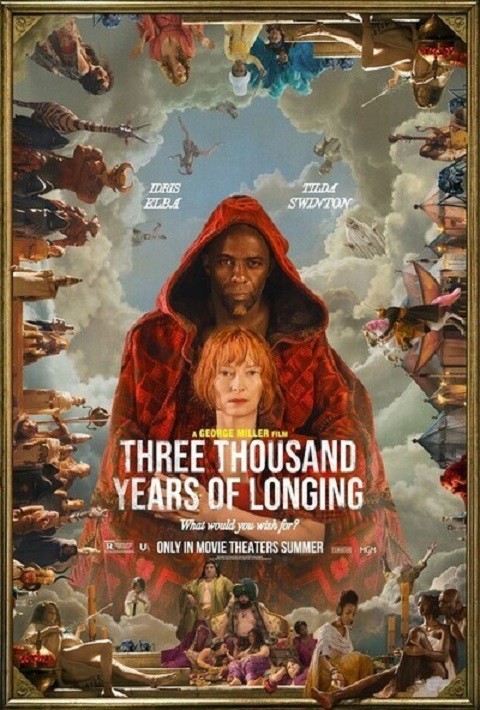- Date of Release: 26 August 2022
- Genre: Drama, Fantasy, Romance
- Language: English
- Watch On: Amazon Prime Video
Three Thousand Years of Longing
Introduction
It is still Wednesday and the new releases for the weekend start tomorrow on a Thursday. But before that I decided to squeeze in a review of another English film titled Three Thousand Years Of Longing which had earlier premiered at the Cannes Film Festival this year. And honestly, I was not very excited for the film despite a solid word of mouth. Probably it was the genre or the one liner which just did not excite me enough. It was almost as an after thought that I decided to give the film a go primarily because of its length which was well short of 2 hours.
The fantasy genre had kick started with Alladin(atleast from the time that I remember). It was a lot of fun in my childhood watching even the reruns. But with time and life hitting me, the fantasy genre was one of my least preferred. So you could add all the great content in it like the recently released The Rings Of Power or The House Of Dragons and I would have skipped them. But as a reviewer, I should be open to all genres and so with that thought I decided to give Three Thousand Years Of Longing a shot. So then is Three Thousand Years Of Longing worth your time, stay tuned.
Story & Screenplay
Three Thousand Years Of Longing follows the story of a lonely scholar who has a chance encounter with a Djinn who offers her three wishes in exchange for his freedom. The story might seem simple but it has a lot to pack in with concepts of love, loss and freedom tackled. I cannot proceed in this section without spoilers(as this film deserves to be watched, explored and discussed) and so viewers discretion is advised. The screenplay at about 110 minutes makes for a watertight watch but it still has a lot to pack in which I will try to explain to the best of my ability.
The drama opens with the introduction of the protagonist whom we know is a scholar and has hallucinations about Djinns. She does not want to address this issue and in fact in a weird manner enjoys these visions. It does show that the protagonist is lonely in life(something which she does refer to later on when she says that she has no siblings, no parents and no friends but she did have a husband once). Soon she has an encounter with a Djinn which changes the dimension of the story.
The drama has a unique charm to it combining events of history in a world filled with love and fantasy. The Djinn here is a far cry from the Genie that you would see in Alladin. One of the key elements of the drama is the storytelling which takes place within the narrative(featuring historic events which are tweaked). As they say, stories unite people as they broaden the mind and give you a different perspective(an attribute which I would dedicate to my Grandma and her unlimited stories, good old days!). So over the three stories, the Djinn does form a bond with the protagonist making her realise the loneliness which she has been through and is going through.
Another interesting aspect of the three tales is that the protagonist has the traits of each of the characters which are narrated to her. So she is quite impulsive as Queen Sheba choosing the Djinn over her love for scholarship(at a later stage). She is also like Gulten who is blinded by her love and doesn’t see the repercussions of it, by wishing to fall in love with the Djinn irrespective of the harm it is causing him. The protagonist is like “The Brothers”- one who prefers to stay lonely and only expresses herself through her books and the other who recognises her responsibility eventually and setting the Djinn free. And finally the protagonist is like Zefir too who has a passion for studying while it is implied that she was trapped in her own marriage too. Each of the cases result in missed opportunities of being granting the wishes by the Djinn.
As they say, love is a beautiful emotion which can blind you at times and make you oblivious of how the other person is feeling. So as a part of her first wish(which only happens in the final act), makes her wanting to fall in love with the Djinn. But love doesn’t behold any terms and conditions. And so when realisation does strike, she wishes for the Djinn to talk to her and eventually sets him free thus signaling her second and third wishes. But at the very end when the Djinn does come to meet her, it is out of his free will and not being bound by any of her wishes. Which brings us to the final question, is the Djinn real?
An interesting piece of information that we get right at the beginning of the film is that the protagonist is a loner and she does get visions often. This made me believe that the character of the Djinn might just be reduced to that in her book which she was writing(we see a glimpse of it at the end). There is an argument of how the character of the Djinn is introduced to her neighbours but as admitted by the protagonist, she has no friends or people around her. So all of it may well have been a figment of her imagination wherein to compensate for her loneliness, she had cooked up a story in her head, featuring the character of Djinn which was an extension of her imaginary friend from her childhood. What do you reckon?
But either way, the drama beautifully captures the essence of love and longing along with smaller nuances of understanding women, rather getting a sneak peek into their lovely minds which are filled with fantasy and at times detached from reality(in a good way, wish men had that ability too), which signify their needs and expectations which are rarely fulfilled in reality. The fantasy world is beautifully captured with effective storytelling, making for a fascinating screenplay which did take me off guard.
Dialogues, Music & Direction
The dialogues are beautifully poignant and leave a lasting impact. The BGM is so soothing and soulful and it manages to enter your heart and into your soul ever so slowly. The cinematography is exceptional and the VFX are filled with vibrant colours which would have made for a beautiful big screen experience. Director George Miller who had directed Mad Max Fury Road, has provided a nuanced tale so gentle that it almost instantly transcends you into a fantasy world filled with love and magic. His direction is exceptional, contributing to so many beautiful moments which seem meditative in more ways that one.
Performances
The performances are wonderfully poetic. Idris Elba as The Djinn delivers a stupendous act which does seem intimidating at the very beginning but really gentle as you move along with his character. A really heartfelt performance by him. Tilda Swinton as Alithea is a very complex character which is exceptionally captured by her. The roller coaster of emotions and allegories which she manages to take you on is so beautiful to witness. This was a quietly towering act by her. All other actors do a splendid job here.
Conclusion
Three Thousand Years Of Longing is a beautifully woven mystical tale of love and fantasy which is a movie watching experience to cherish and savour. The fantasy as a genre has now found a new life in me! This one comes with my highest recommendation!




